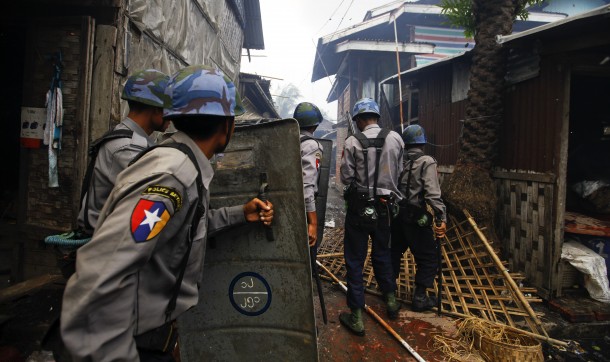RANGOON — A Sittwe District Court in Arakan State on Monday extended the detention of Rohingya activist Kyaw Hla Aung, who has now spent 13 months in Sittwe Prison and is accused of multiple criminal charges, human rights group Fortify Rights said.
Kyaw Hla Aung is considered a political prisoner by the UN human rights rapporteur and international rights groups. The rapporteur has said he is one of six Rohingya activists being detained on political grounds, while another four men who worked for international aid groups are also being arbitrarily detained.
Fortify Rights called for Kyaw Hla Aung’s unconditional release in a statement released on Tuesday, saying that he is being arbitrarily detained and that the prosecution has failed to produce any witnesses in his case.
“The case against him is completely without merit. His ongoing detention violates his basic human rights and is an affront to the rule of law,” Matthew Smith, executive director of the Bangkok-based group said, adding that there is an “urgent need for the central government to intervene to free him.”
Kyaw Hla Aung, 74, is a Rohingya community leader and rights activist who has worked for the stateless Muslim minority in northern Arakan State for decades. He has worked as an administrator for Médicine Sans Frontièrs (MSF) in Burma, served as a clerk at Sittwe District Civil Court and ran for political office in the early 1990s.
He has been targeted by authorities and was repeatedly imprisoned during the past three decades.
Currently, he is facing six charges under the Penal Code and could be sentenced to 20 years in prison, Fortify Rights said. Kyaw Hla Aung was reportedly detained after he attempted to intervene when a government operation to verify the citizenship status of Rohingya population in July 2013 caused tensions because authorities insisted on registering the group as “Bengalis,” to suggest that they are illegal immigrants from Bangladesh.
Fortify Rights said it believes that “authorities targeted Kyaw Hla Aung because he is a well-educated Rohingya with connections to the international community and an ability to communicate to a wider audience about the situation in [Arakan] State, where severe human rights violations persist against Rohingya Muslims.”
The Burmese government does not recognize the citizenship of the approximately 1 million Rohingya in Arakan State, which has been wracked by recurrent outbreaks of inter-communal violence between Buddhist Arakanese majority and the Rohingya since 2012.
Since 2012, authorities have arrested hundreds of Rohingya men and boys, according to rights groups, who allege that many are being arbitrarily detained or held in indefinite pre-trial detention.

















